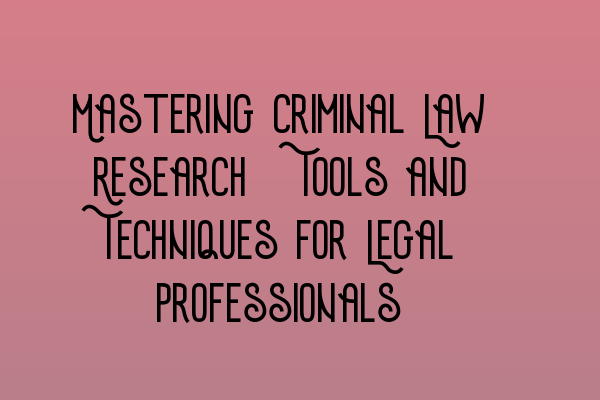Mastering Criminal Law Research: Tools and Techniques for Legal Professionals
When it comes to criminal law research, the ability to quickly find and analyze relevant information is crucial for legal professionals. Whether you are a solicitor, barrister, or law student, having a strong foundation in research methods can greatly enhance your effectiveness in the field.
The Importance of Effective Criminal Law Research
Effective criminal law research allows legal professionals to build strong cases, stay up-to-date with recent developments in the law, and provide accurate advice to clients. With the advancement of technology, the tools and techniques available for conducting research have significantly evolved.
Nowadays, legal professionals have access to a vast array of online resources, databases, and search engines that can expedite the research process. However, knowing how to leverage these tools effectively is key to mastering criminal law research.
Key Tools and Techniques for Criminal Law Research
1. Online Legal Databases: Utilizing reputable online legal databases, such as Westlaw and LexisNexis, can provide legal professionals with access to a wealth of case law, statutes, regulations, and legal commentary. These databases offer advanced search functionalities and customizable filters, allowing for targeted research.
2. Criminal Law Journals: Subscribing to criminal law journals and staying updated with the latest legal articles can help legal professionals understand emerging trends, court decisions, and scholarly opinions. Journals like “Criminal Law Review” and “Criminal Law and Justice Weekly” offer invaluable insights into the field.
3. Government Websites: Government websites, such as the UK Parliament website and the Ministry of Justice website, provide access to legislation, official reports, and policy documents. These resources can be essential for understanding the current state of the law and any proposed changes.
4. Legal Blogs and Forums: Engaging with the legal community through blogs and forums can offer a unique perspective on criminal law issues. Blogs like “The Criminal Solicitor Blog” and forums like “The Student Room” provide platforms for legal professionals to share insights, discuss cases, and seek advice from peers.
The Benefits of Mastering Criminal Law Research
By honing their research skills, legal professionals can reap several benefits:
- Developing a comprehensive understanding of criminal law principles and legal precedents.
- Building persuasive and well-supported arguments in court.
- Identifying relevant case law to strengthen legal arguments.
- Staying up-to-date with changes in legislation and judicial decisions.
- Providing accurate and informed advice to clients.
Mastering criminal law research is an ongoing process that requires continuous learning and adaptation to new technologies and developments in the legal field. By utilizing the tools and techniques mentioned above, legal professionals can enhance their research capabilities and ultimately excel in their practice.
Conclusion
Effective criminal law research plays a vital role in the work of legal professionals. By leveraging the tools and techniques available in today’s digital age, solicitors, barristers, and law students can improve their research efficiency and provide high-quality legal services to their clients.
To learn more about legal practice and exam preparation, check out these related articles:
- SQE Exam Prep: Essential Study Materials for Aspiring Solicitors
- Expert Testimonies in UK Courts: Building Strong Cases
- Demystifying the Solicitors Qualifying Examination Format
- SQE Exam for International Lawyers: Challenges and Success Strategies
- LLC Formation Made Simple: Step-by-Step Guide for UK Entrepreneurs
